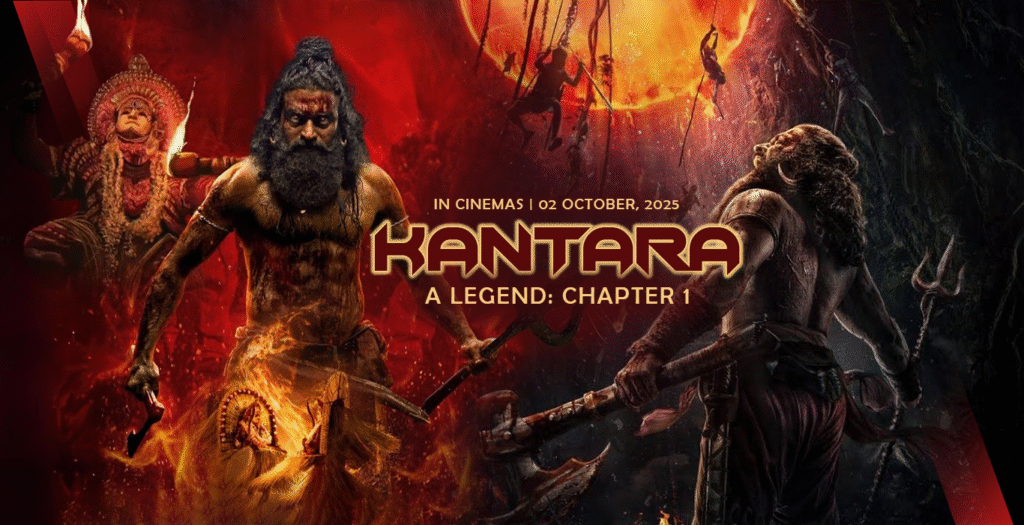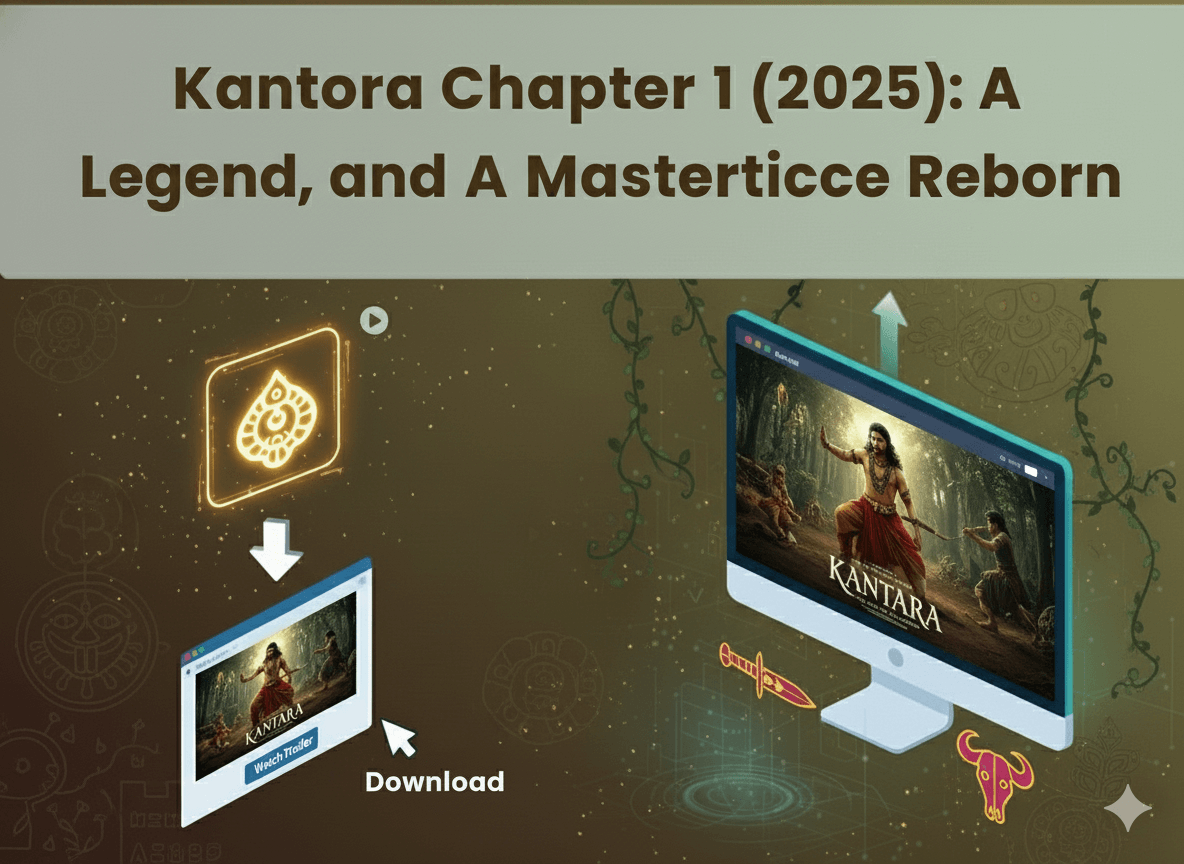In 2025, Indian cinema witnessed one of its most spiritually profound and visually mesmerizing films, Kantara Chapter 1, directed by Rishab Shetty. A prequel to the 2022 blockbuster Kantara, this chapter takes audiences deeper into the origins of the mystical land, its divine guardians, and the unbroken bond between man, nature, and deity.
Watch official trailer:
Set during the Kadamba dynasty, the film intricately weaves together mythological lore, historical context, and powerful emotional storytelling, resulting in a cinematic experience that feels both ancient and timeless.
Kantara Chapter 1 Plot Summary: A Return to the Sacred Origins

Kantara Chapter 1 opens during the reign of the Kadamba kings, a period when faith and power constantly clashed. Also, King Vijayendra, driven by greed, seeks to conquer the sacred spice gardens hidden deep within the Kantara forest, protected by the divine spirits Panjurli and Guliga.
When Vijayendra defies the ancient covenant, the spirits intervene, leading to his downfall. His son, Rajashekara, inherits the throne and bans all entry into the forest, fearing the daivas’ wrath.
Years later, a divine child named Berme is found within the forest’s sacred well and raised by tribal villagers. Berme grows into a fearless and compassionate young man, deeply in tune with the forest’s rhythms. His journey beyond Kantara introduces him to the Bangra Kingdom, where he discovers exploitation in the spice trade.
Berme decides to lead his people toward independence, challenging the royal monopoly. So, this rebellion draws the attention of King Kulashekhara, leading to a brutal conflict that ignites both political and divine wrath.
Possessed by the fierce spirit Guliga, Berme becomes the vessel of divine justice, battling oppression and restoring the balance between the mortal and spiritual realms. Yet, the arrival of Kanakavathi, Kulashekhara’s sister and Berme’s love, adds layers of betrayal, passion, and mysticism that culminate in a breathtaking, symbolic climax.
Kantara Chapter 1 Cast and Performances




The strength of Kantara Chapter 1 lies not only in its narrative depth but also in its powerhouse performances.
- Rishab Shetty as Berme: Returning as writer, director, and lead actor, Shetty delivers a commanding performance that’s both spiritual and physical. His portrayal captures Berme’s evolution, from innocence to divine embodiment, with extraordinary range.
- Rukmini Vasanth as Kanakavathi: Rukmini’s performance is hauntingly graceful, embodying mystery and inner conflict. Her chemistry with Rishab adds emotional tension throughout the film.
- Jayaram as King Rajashekara: As a ruler torn between fear and faith, Jayaram brings regal authority and nuance to his role.
- Kishore, Sapthami Gowda, and Achyuth Kumar contribute strong supporting performances, grounding the film in realism and emotion.
Critics have widely praised Rishab’s ability to bring authenticity to every frame, using minimal dialogue and rich cultural cues to express complex ideas.
Direction and Vision: Rishab Shetty’s Expanding Universe
After the phenomenal success of Kantara (2022), Rishab Shetty had an almost impossible task. He has to return with something bigger yet more meaningful. After Chapter 1, he not only met expectations but redefined what myth-based cinema could achieve.
Shetty’s direction strikes a balance between folklore and realism. His storytelling honors the Buta Kola tradition, presenting it as both a cultural ritual and a cosmic bridge between man and divinity.
In interviews, Shetty revealed that the prequel allowed him to explore the philosophical origins of Panjurli and Guliga, their bond with humanity, and the consequences of greed and spiritual imbalance.
In addition, The film’s symbolism of the sacred well, where Berme both emerges and vanishes, is Shetty’s masterstroke, representing rebirth, divine justice, and continuity between chapters.
Kantara Chapter 1 Production and Cinematography

Produced by Hombale Films, Kantara Chapter 1 was mounted on an estimated ₹120 crore budget, significantly higher than its predecessor’s ₹20 crore production cost.
Filming Locations
Principal photography took place across coastal Karnataka, Western Ghats, and Goa’s spice plantations, capturing the raw, untouched essence of nature. The filmmakers used natural lighting and traditional lensing techniques to achieve a visual palette that feels organic and immersive.
Cinematography
The acclaimed Arvind S. Kashyap returned as the cinematographer, blending lush greens, fiery rituals, and golden sunsets into a visual poem. Every frame feels sacred, transporting viewers into a world where nature breathes with divine presence.
Music and Sound Design
Composer B. Ajaneesh Loknath once again crafts a transcendent score. Tribal chants, folk instruments, and percussion rhythms evoke deep spirituality. The songs, including “Daiva Varase,” “Kantara Nadige,” and “Berme’s Anthem,” became instant chart-toppers on streaming platforms.
Each track carries emotional weight, the music doesn’t just accompany the visuals, it narrates them.
Cultural Depth and Symbolism
Kantara Chapter 1 continues to serve as a cinematic archive of India’s folk spirituality. The film explores themes like:
- Faith vs. Authority: The Kadamba king’s defiance of divine law parallels modern greed and environmental exploitation.
- Divine Justice: The daivas’ intervention symbolizes nature’s revenge and spiritual balance.
- Identity and Resistance: Berme’s journey embodies the struggle of indigenous communities protecting their land and culture.
- The Feminine Divine: Through Kanakavathi and the goddess Chavundi, the film celebrates feminine energy as both nurturing and destructive.
Critical Reception and Box Office
Upon release, Kantara Chapter 1 opened to record-breaking collections, grossing over ₹600 crore globally within its first month. Critics hailed it as “a masterpiece that merges myth and realism seamlessly.”
International audiences and film festivals praised its cinematography, authenticity, and narrative rhythm, comparing it to global mythic epics like Avatar and Apocalypto.
Rotten Tomatoes recorded a 96% critic score, while IMDb users rated it 9.1/10, making it one of the highest-rated Indian films of 2025.
Where to Watch and Download Kantara Chapter 1
For those eager to experience this epic again or watch it offline, it’s available on major OTT platforms. However, if you wish to save Kantara Chapter 1 for offline viewing, always use trusted, secure tools.
Platforms like VideoDownloaderOnline.com allow users to:
- Download Kantara Chapter 1 in MP4 high-quality formats.
- Extract its haunting soundtrack in MP3 for offline listening.
- Access it across mobile, tablet, and desktop devices.
- Using verified platforms like this ensures:
- Safe, malware-free downloads
- High-speed conversion
- Retention of video and sound quality
It’s the most reliable way to rewatch Kantara without streaming delays. Whether you’re studying its cinematography or revisiting your favorite sequences.
Also read: How to Download Dailymotion Videos to MP3?
Behind the Scenes: Making the Legend
Rishab Shetty reportedly underwent months of spiritual preparation before shooting the Guliga possession scenes, participating in traditional rituals to understand the emotional gravity.
The team collaborated closely with local priests and cultural historians to ensure accurate representation of Daiva worship and folk dance traditions. No VFX shortcuts were used during key sequences, especially during the Buta Kola performance, adding a raw, sacred intensity to the experience.
Even the costumes were handcrafted using natural dyes and tribal weaving techniques sourced from coastal artisans.
Anticipation for Kantara: Chapter 2
The film’s ending, where Berme dives into the sacred well, has sparked countless fan theories. Some believe Berme transcended into divine form, becoming a full manifestation of Guliga. Others see it as a cyclical rebirth that ties directly to the 2022 film’s protagonist.
Director Rishab Shetty has confirmed that Kantara: Chapter 2 will continue exploring the metaphysical connection between divine guardians and human destiny, bridging ancient myth to the modern world.
Conclusion: A Spiritual Masterpiece Beyond Cinema
Kantara: Chapter 1 is more than just a film; it’s a meditation on faith, folklore, and the eternal rhythm of creation and destruction. Its combination of authentic ritual depiction, soulful music, and powerful visual storytelling cements Rishab Shetty’s place among India’s visionary directors.
And for those who wish to carry the spirit of Kantara beyond the theater, platforms like VideoDownloaderOnline.com make it effortless to revisit its divine imagery anytime, anywhere, preserving the legacy of this timeless saga.







